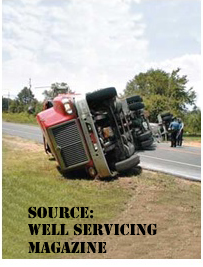Can Cargo Tank Rollovers Be Prevented?
September 10, 2014 | Category: Motorcycle Accidents, Vehicle Rollovers | ShareCargo tank trucks are used in transporting essential hazardous materials such as gasoline, gases, chemicals and non-hazardous materials like milk, cement and water. They are usually longer, heavier and require more driving skill than single vehicles.
 When a cargo tank truck rollover accident occurs it not only can result in fatalities and/or injuries, but especially in urban areas, can result in roadway damage and traffic delays. When combustible and/or hazardous cargo are involved, the losses are even greater.
When a cargo tank truck rollover accident occurs it not only can result in fatalities and/or injuries, but especially in urban areas, can result in roadway damage and traffic delays. When combustible and/or hazardous cargo are involved, the losses are even greater.
The Federal Motor Carrier Safety Administration (FMCSA) reports that close to 1,500 cargo tank rollovers are reported each year. This is an average of about 4 rollovers every day. In addition to causing serious injury and often death for drivers and passengers of smaller vehicles, rollovers cause over 800 deaths to the cargo tank truck drivers themselves every year. In fact, cargo tank truck drivers die in roughly 55 percent of all rollover accidents.
"The importance of reducing cargo tank truck rollovers, cannot be underestimated. Reducing the number from 'four rollovers per day' to 'no rollovers per day' is the goal," says Truck Accident Attorney, Randall Spivey of Spivey Law Firm, Personal Injury Attorneys, P.A.
The FMCSA believes that the tank truck industry has an outstanding safety record due to well-trained drivers and well-maintained equipment. The one blemish it sees on the industry’s scorecard is that there are still too many tank truck rollovers. The most frustrating thing the FMCSA finds about tank truck rollovers is that they are almost all preventable. Over 78 percent of rollovers involve some type of driver error.
The primary causes of cargo truck rollovers are:
- Failure to adjust speed to the height and weight of the load being carried. Fully loaded rigs are 10 times more likely to rollover in a collision than empty rigs.
- Turning too sharply or changing lanes too quickly.
- Going too fast on an on-ramp or off- ramp.
- Inattention, dozing or distraction resulting in sudden course corrections or braking. When lightly loaded, the very stiff suspension springs and strong brakes give poor traction and make it very easy to lock up the wheels. When the wheels lock, the trailer can swing out and strike other vehicles or it can jackknife very quickly.
The Transportation Research Board (TRB) in "The Role of Human Factors in Preventing Cargo Tank Truck Rollovers" (completed in January 2012), developed a plan based on the lessons learned from the 2007 FMCSA "Cargo Tank Roll Stability Study". This study looked at four complementary approaches to reducing the number of cargo tank truck rollovers:
- Redesigning the highways. Examples include signs at freeway exits that impose lower speed limits on trucks.
- Redesigning the vehicles. The static rollover threshold of a truck and trailer is a measure of its propensity to overturn . It is measured in G-forces ( a ratio to the standard gravity of 1.0) The higher the ratio, the greater the truck's stability. This measure is used in truck/trailer design. A static roll threshold of .45 is more stable than one of .35. Modern trailer design aims for a low center of gravity and Static Roll Threshold of greater than .45.
- Deploying electronic stability aids, On May 23, 2011, NHTSA published NPRM (77 FR 30766) that recommended electronic stability control on combination vehicles which should reduce the number of rollovers in the future. Stability control systems employ sensors that tell the vehicle's onboard computer when weight is shifting or is about to shift. The computer automatically applies brakes to one or more wheels to compensate until balance is restored.
- Improving the training of drivers. Efforts geared toward reducing driver error included a training video which was developed jointly by PHMSA (Pipeline and Hazardous Materials Safety Administration) , FMCSA and NTTC (National Tank Truck Carriers). The Cargo Tank Rollover Prevention Video is available from NTTC at no cost with Spanish subtitles on the NTTC website, or from the Federal Motor Carrier Safety Administration (FMCSA). A driver education program was also initiated that included safety posters, rollover prevention tips and information that was placed in driver correspondence (such as pay stubs mailed to the homes of drivers).
Truck Accident Attorney, Randall L. Spivey is a Board Certified Trial Attorney – the highest recognition for competence bestowed by the Florida Bar and a distinction earned by just one (1%) percent of Florida attorneys. He has handled over 2,000 personal injury and wrongful death cases throughout Florida. For a free and confidential consultation to discuss your legal rights, contact the Spivey Law Firm, Personal Injury Attorneys, P.A., in Lee County at 239.337.7483 or toll free at 1.888.477.4839,or by email to Randall@SpiveyLaw.com. Visit SpiveyLaw.com for more information. You can contact Spivey Law Firm, Personal Injury Attorneys, P.A.in Charlotte County at 941.764.7748 and in Collier County 239.793.7748.

